Somalis love their meat. With the country predominantly nomadic, and with livestock as one of its main exports, it’s only natural that meat is an important component of the Somali diet. Yet Somalis (in Somalia) are generally known to be quite lean. The main reason was moderation in consumption and a lifestyle that demanded physical exertion. A fat Somali nomad is unheard of!
For most Somalis, moderation in eating was dictated by their modest means. Every bite was savoured, every cartilage chewed, every marrow sucked, and every bone polished dry. Every animal part had a unique name and it is not the same for all types of animals. The nomenclature is different for camels, cows, and sheep.
In rural areas, gender and age determined which parts of the animal you ate. Men get the first crack at it, women are next, and children come last. However, some of the urban areas do not follow that custom.
One of the best memories I have of Somalia, is going on the weekends (Fridays) to Bar Abukar, which was located between the capital Mogadishu and the town of Afgoi. The food they served on the outdoor dining enclosures was simple yet very delicious. It was alfresco dining at its best.
On the menu was tender, succulent, milk-fed baby goat and Somali rice. The meal was washed down with cold, sweetened camel milk. In the dining enclosures, the roof was fragrant acacia trees and the floor was unsoiled soil that was better than the finest Persian rugs.
The following recipe is dedicated to all the cooks at Bar Abukar and the nearby Bar Xaraf. This is a special thank you for all those meals that they have delighted us with.
Les Somalis aiment leur viande. Dans une pays prédominamment nomade, où le bétail fait partie des principales exportations, il est naturel que la viande soit un aliment important de l’alimentation Somali. Cependant les Somalis (en Somalie) sont en général très minces. La raison principale est la modération dans la consommation et un mode de vie qui demandait beaucoup d’effort physique. Un nomade Somali gros ça n’existe pas!
Pour la plupart des Somalis, leur manque de moyens leur imposait de manger avec modération. Chaque bouchée était savourée, chaque cartilage mâché, toute la moelle sucée, et chaque os rongé. Chaque morceau de l’animal a un nom particulier qui n’est pas le même suivant le type d’animal. La nomenclature est différente pour les chameaux, les vaches, et les moutons. Dans les zones rurales, le genre et l’âge déterminaient quels morceaux de l’animal on mangeait. Les hommes se servent en premier, ensuite les femmes, puis les enfants arrivent en dernier. Cependant certaines zones urbaines ne suivent pas cette coutume.
Un des meilleurs souvenirs que j’ai de la Somalie, est lorsque nous partions le week end (Vendredis) à Bar Abukar, qui est situé entre la capitale Mogadishu et la ville d’Afgoi. La nourriture qui était servie dans les aires de repas en extérieur, était simple mais très délicieuse. C’était le meilleur dîner alfresco.
Au menu, il y avait du chevreau de lait tendre et succulent, et du riz Somali. Le plat était accompagné de lait de chameau frais sucré. Dans ces aires de repas, les acacias parfumés formaient le toit et le sol était la terre immaculée qui était plus agréable que le plus fin des tapis Persans.
La recette qui suit est dédiée à tous les cuisiniers de Bar Abukar et de Bar Xaraf voisin. En remerciement de tous ses repas dont vous nous avez régalés.
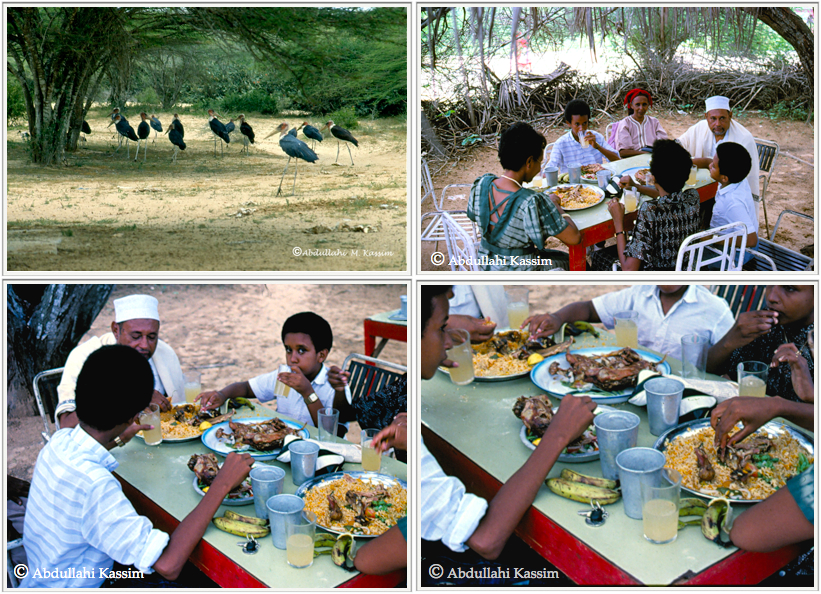
The Kassim family having lunch at Bar Abukar. Near Mogadishu, Somalia - La famille Kassim déjeunant à Bar Abukar
Ingredients:
1 Shoulder of a milk-fed baby goat (from a 3 week old, 15 pound goat) – you can also use baby lamb
1 Leg of a milk-fed baby goat (from a 3 week old, 15 pound goat) – you can also use baby lamb
8 cloves Garlic (minced)
1 Lemon
2 tbsp Vegetable seasoning
¼ cup Olive oil
1 tsp Black pepper
4 Potatoes
Ingrédients:
1 Épaule de chevreau de lait (chevreau de 15 livres (7 kg) de 3 semaines)
1 Gigot de chevreau de lait (chevreau de 15 livres (7 kg) de 3 semaines)
8 Gousses d’Ail (hachées)
1 Citron
2 cs de Condiment légumes
¼ de mesure d’Huile d’Olive
1 cc de Poivre Noir
4 Pommes de Terre
Directions:
Make the marinade by combining the minced garlic, juice of a lemon, vegetable seasoning, olive oil and the black pepper. In a large roasting pan, coat the goat (or lamb) leg and shoulder with the marinade. Let the meat marinade for about an hour.
Preheat the oven to 500 F. When the oven reaches the desired temperature, cover the roasting pan with aluminun foil and place in the oven. Cook for 1 1/2 hours. Add the sliced potatoes and cook for an additional 1/2 hour.
For the last step, remove the aluminum foil and let the goat (or lamb) and potatoes roast for 10 minutes.
Instructions:
Préparer la marinade en assemblant l’ail haché, le jus de citron, le condiment légumes, l’huile d’olive et le poivre noir. Dans un grand plat à rôtir, recouvrir le gigot et l’épaule de chevreau avec la marinade. Laisser la viande mariner pendant une heure.
Préchauffer le four à 500°F/ 260°C. Quand le four est à la bonne température, couvrir le plat avec de l’aluminium et l’enfourner. Cuire 1 heure et demie. Ajouter les pommes de terre coupées en tranches et cuire une demie heure de plus.
Pour la dernière partie de la cuisson, retirer le papier aluminium et laisser le chevreau et les pommes de terre rôtir 10 minutes.

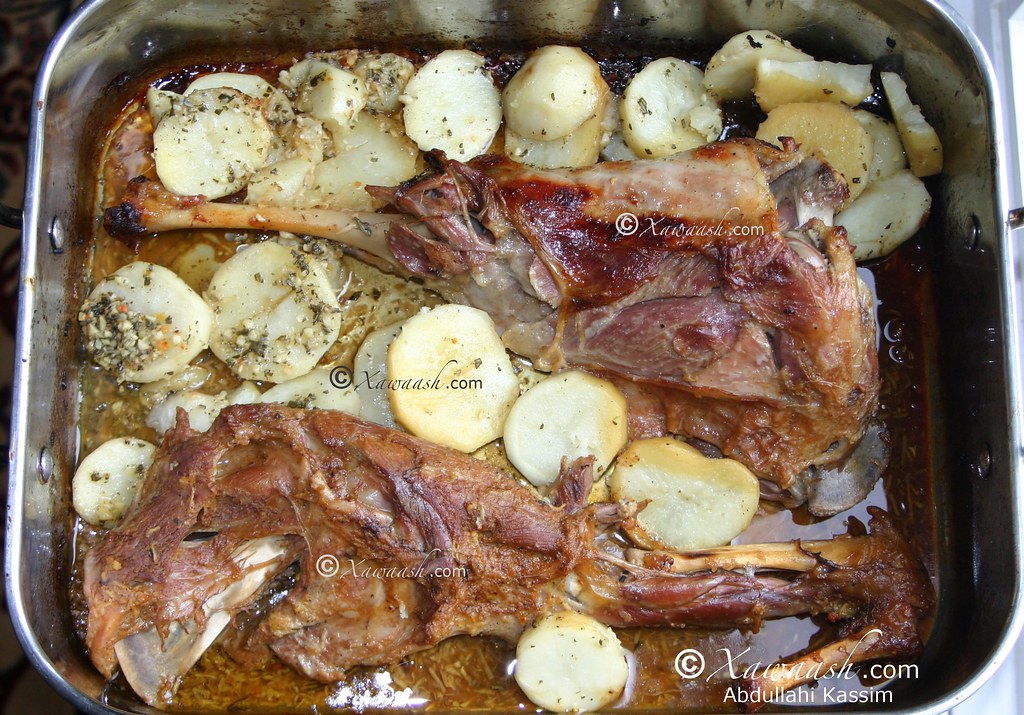


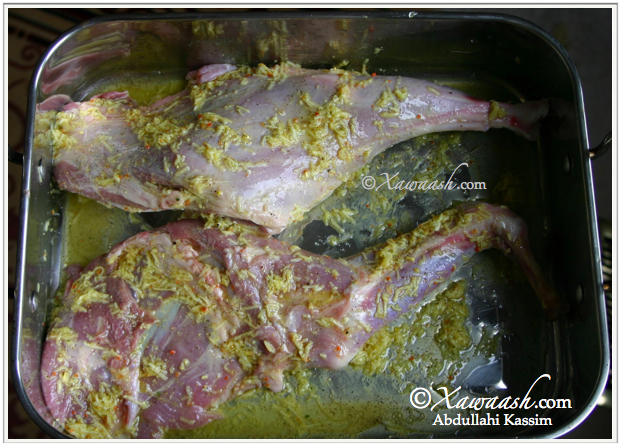
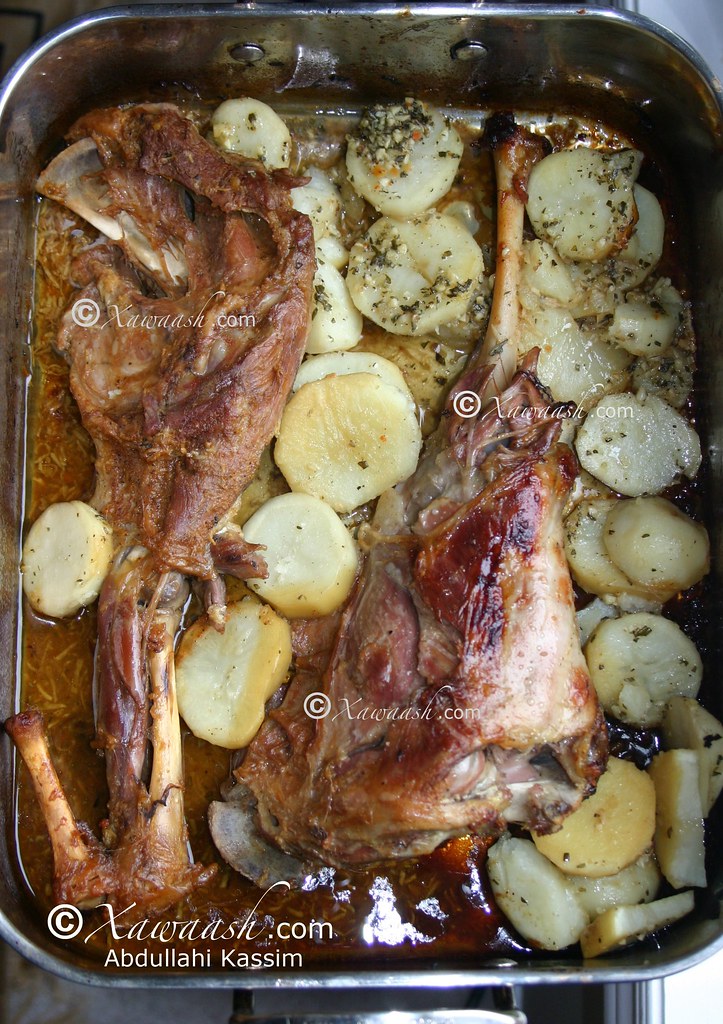
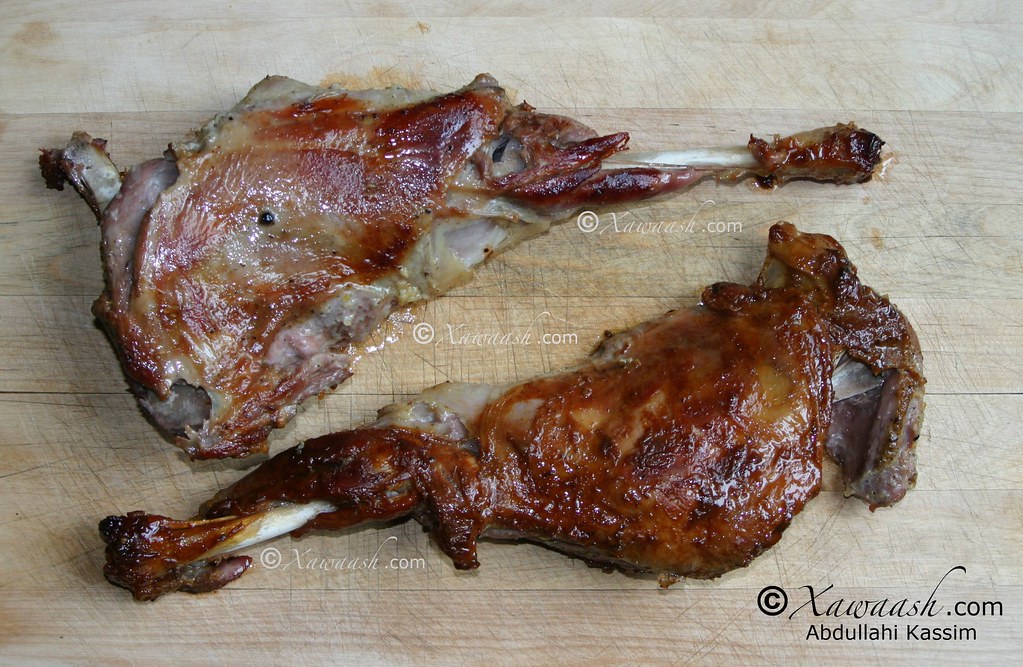
hi just where can i buy the milk fed goat in toronto.
We did a Google search and a few places came up. We cannot recommend any places that we are not familiar with.
This is absolutely the BEST dheylo
la diyaariyo baahi aa igeliseen @_@
Thanks for sharing this great recipe!
Wa Jazakum Allah Khair …
Thank you very much for the comment.
I really enjoy this website. I’m going to try and recreate this as soon as I find a place that sells baby goat in Toronto.
Thank you for your comment. You can also use fresh lamb if you can’t find goat.
good
Thank you.
Xasuus xasuus, waayo-waayo, bar Abukar ma tegin Laakiin Jimco aan Xaraf tagney anagoo iskooley badan ah, Maama mia, calool xanuun iyo xasuus, waxaa u mudaa inaan carfin karo dhaylo-daas.. maasha allaah. dhaqaankeenaa xafideene ilaahey ha idin xafido.
Aad ayaa ugu mahadsan tahay faalladaada. Waan ku-faraxnay waayo waayo inaan ku-xasuusinnay, waan ka-xunnahay calool xanuunka.
maacaleesh, calool xanuunka waa laga baxaa.. ilaahey agtiisa waxba kama aha.. insha allaah khair. dal nabada iyo dad bed qaba.
Aamiin walaal.
waxaan aad u mahadsantahay xawaash.com oo u kacay inuu ilaaliyo qaranimada umada soomaaliyeed iyo dhaqan soortooda taas oo aniga iyo dadka kale nagu dhiirigelinaysaa inaan ku qanacno waxaanu nahay illahay ha idinka abaal mariyo bahda xawaash.com
jazaakalaahu kheyran walal waxa aan u bahanahay sida bidzada lo sameyo thank you
Hadduu Eebbe idmo mar dhow ayaan soo gelin doonnaa. Mahadsanid.
a warm greeting from an Algerian. A Somalian food lover. I had such experience with Suqaar and Sambusa during my trip to Ottawa Canada last two years
Thank you so much for your warm greetings and for taking the time to comment. We hope that you will try this recipe.
Salaam A&L.
My parents used to take us to these two restaurants, bar xaraf and bar abubakar. They served the most delicious food I have ever tasted. Thank you very much for bringing memories of good old xamar. Yaa Rab wadankeena nabad nooga dhig.
We are happy we brought back good old memories. We hope that preparing this recipe will help you relive those days. Thank you for your comment.
“you can also use baby lamb”
translates to Vous pouvez aussi utiliser de l’agneau de lait
if you want to add it to the page
Merci beaucoup!
asc waalawaal waan idin salaamaa dha maan tiin ilaahna haidin dhoowro walaal waxaan idin weydiinaa cun tooyinka qaar male meel afsoomaliya sida hada dheeyladaanoo kale mida kale faniilo waa maxay adinkoo mahad san jasaakalaahu kheeyr
Wacalaykum Assalaam Waraxmatullaahi Wabarakaatuh.
Waa ku mahadsan tahay salaanta wacan iyo ducada. Hadduu Eebbe idmo waan kuu tarjumi doonnaa. Faniila waa carfis macmacaanada lagu daro sida buskudka iyo doolsheyaasha. Af Ingiriisiga waa (vanilla) af Carabina waa روح الفانيليا.